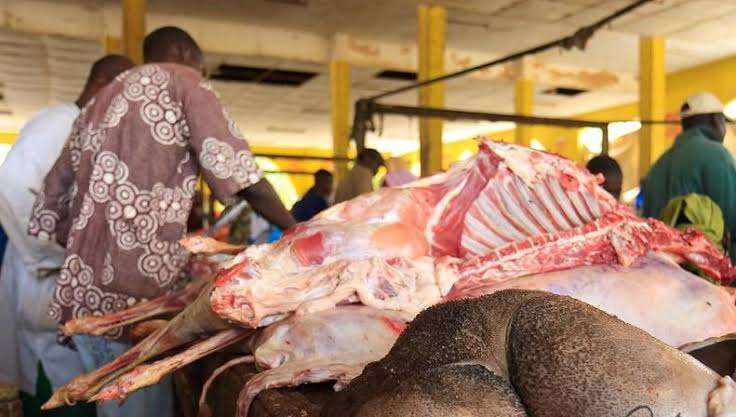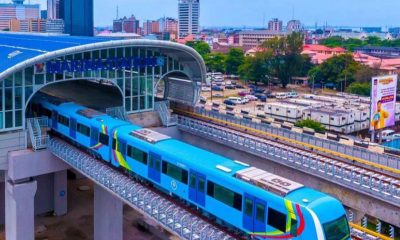Business
Lagos N500bn Food Security Programme threatens banks, butchers

. Stakeholders may lose N60bn annual revenue
Financial institutions, cooperative societies, butchers and meat sellers across the 20 Local Government Areas (LGAs) and 37 Local Government Development Areas in Lagos State can expect the recently launched ‘Produce for Lagos Program’ to hurt their bottom-lines and livelihoods, Business Hallmark’s findings have revealed.
While financial institutions that bankrolled past agro-allied projects in the state like the Eko Refrigerated Meat Vans, which are now under threat of imminent collapse, butchers and associated businesses in the state are fearing the loss of their livelihoods to the new programme.
The N500 billion ‘Produce for Lagos Food Program’, an initiative of the Lagos Food Systems Infrastructure Company (LFSIC), was launched on July 23, 2025 by Lagos State governor, Babajide Sanwo-Olu, to enhance food security and promote economic development in the state.
The governor also inaugurated 150 40-feet Compressed Natural Gas (CNG) powered trucks to ease food logistics in and out of the state.
The trucks would transport food products from across the country to Lagos in order to reduce post-harvest losses.
During the official launch of the program, the state Commissioner for Agriculture and Food Systems, Mrs. Abisola Olusanya, said it was part of the Lagos State Agricultural and Food Systems Roadmap launched in 2021.
Good intentions
According to Olusanya, the program will address the informal and uncoordinated flow of food into Lagos by introducing a data-driven framework that enables states to track and optimize the supply of agricultural produce to the state.
“The Produce for Lagos Program is designed to strengthen ties with major food-producing states, improve supply chain efficiency, reduce food costs and post-harvest losses, guarantee market access for farmers and agribusinesses, create sustainable livelihoods across the agricultural value chain,” the commissioner explained.
The initiative includes a N500 billion off-take guarantee fund, which positions Lagos as a reliable off-taker and strategic partner with food-producing states like Niger, Benue, Kogi, Ogun, Taraba, Nasarawa and Plateau.
One of the main sponsors of the Produce for Lagos initiative, Chairman of United Bank for Africa (UBA), Mr. Tony Elumelu, pledged the sum of N25 billion during its launch on July 23.
“We believe that joblessness is a major deterrent for our young people. They shouldn’t be idle—we have arable land that can be cultivated. So, all of us must work together to make this vision a reality. You’ve done your part, and private capital must now play its role.
“This is a very critical initiative that all of us should proudly associate with. What you and your team are doing here, and what other governors are doing in their respective states, will collectively help tackle the problem of joblessness among our youth in the coming years.
“You’ve done your part, and we, guided by African values and federal policy, will do ours to make things better for everyone. We believe in this cause, and together we will bring this vision to life. As the private sector, we will support you.
“As soon as I got the invitation, I told the group managing director at UBA to join me here. I also told the current CEO of our transport group to come and observe how they can key into this initiative. From the first call, we knew this was something worth supporting.”
Also speaking at the event, Governor Sanwo-Olu said besides other projects around the food and agriculture sector being implemented, the Produce for Lagos program was the next logical step in the roadmap.
According to the governor, the programme would provide guaranteed off-take contracts, financing access and logistics support, connecting Lagosians directly with Lagos’s dynamic food economy.
Sanwo-Olu assured that the scheme would boost agricultural production, reduce reliance on informal and uncoordinated supply channels, create jobs for the youth and increase economic returns for all ecosystem stakeholders.
“Lagos is Nigeria’s food market and we consume over 50 per cent of the food that is traded in the Southwest part of the country.
“We have a food economy that is valued at over N6 trillion, it is also noted that Lagos loses 50 per cent of its food largely due to poor storage and inefficient transportation.
“It became clear that we must organize our food systems to feed our people well.
“That is why we are launching Ecolog logistics trucks through the Lagos State Food Systems Infrastructure Company.
“So, for us the N500 billion is just a tip, and as you see that some of our friends in private sector are beginning to show interest.
“What we are doing here is that we are creating a whole new agricultural ecosystem, one that will rise from the demands of today and tomorrow, to combining our policy that will be well focused, creating a financial model that will outlive us.
“And building infrastructure that will live even for generations that are coming behind us and ensuring that we have a robust database that everybody can work on,” Sanwo-Olu said.
Over N100 billion have been raised, with a substantial part of it already disbursed to participating states that will cultivate yams, beans, maize, livestock, and other food products for Lagos markets.
Unintended Consequences
Meanwhile, while millions of expectant Lagos residents hope the program will crash the prices of food items in the state, especially beef, some players in the sector fear its design and implementation may negatively affect their businesses.
Pointers to the dark cloud coming their way came to light last week, when Niger State governor, Umar Bago, announced that his state will stop the direct supply of live cows, goats, and rams to Lagos and markets in the Southwest.
Bago, while speaking at the recent First Bank 2025 Agric and Export Expo in Lagos, said Niger State would, instead process meat locally and deliver frozen products to the Southwest.
According to the Niger governor, states exporting raw products without processing inevitably lose economic value.
“We have started looking at the possibility of stopping the supply of live cows to Lagos markets. We will terminate supplies of cows and goats at Mokwa, process the meat in Niger State, and deliver frozen products to markets in Lagos and Ogun,” Bago disclosed.
Bago explained that the move will boost economic value for local farmers and butchers, who will get maximum benefits from value addition across the livestock chain like meat, hides, and other by-products.
The initiative, he added, will also enhance hygiene by preventing animal waste from littering southern states.
BH findings revealed that the initiative will mostly affect butchers and hide processors who kill and process the over 10,000 cows slaughtered daily in abattoirs scattered across the state.
“Lagos slaughters not less than 10,000 heads of cattle daily, these include what is slaughtered in our barracks”, said the state Commissioner for Agriculture, Abisola Olusanya, during a ministerial press briefing in May 2024 to mark the first year of the second term in office of Governor Sanwo-Olu administration in office.
According to Olusanya, while the agriculture sector contributes N7 trillion to the state’s Gross Domestic Products (GDP), the Lagos food market size stands at N9 billion in daily transaction value and N5 trillion annually.
Expected Losses
BH findings from professional butchers showed that it cost between N20,000 to N45,000 to slaughter and process a full cow in the state. The cost outlay includes the wages of the butchers, who are, at least, two; payment to the vulcanizer, who normally pump air into the already slaughtered cow so that its hair can be easily removed, cooking gas, pot, and industrial stove to boil the water to be used in treating the cow skin.
“The cost can either go up or down if the owner is taking up some responsibilities like providing the stove, cooking gas and cooker to process the cow,” a butcher by the name Idris Tajudeen told our correspondent.
BH also gathered that independent butchers are entitled to a part of the cow they are contracted to kill like the neck, but some owners, who do not want to part with meat, it was learnt, normally monetize it.
Using the least amount of slaughtering and processing a cow, which is N20,000, cow processors in the state earn, at least, N200 million daily on the 10,000 processed cattle.
With the take-off of the Produce for Lagos initiative, and the resolve of the Niger governor to start processing the meat in his state, the volume of livestock slaughtered and processed in Lagos is expected to fall drastically.
Some butchers in the state, who spoke to our correspondent, said they expect the number of processed cattle to decline by more than half.
“We used to slaughter up to ten cows a day in this small abattoir before the current economic hardship. It fell to five, and we will be lucky if we get two to slaughter and process when the Niger State starts to implement the plan,” said Tajudeen, who is based in Agege, Lagos.
Another set of operators likely to be negatively impacted by the Produce for Lagos initiative are multipurpose cooperative societies and financial institutions that financed the construction of abattoirs, refrigerated vans used to transport meat to the market, and cooling rooms used to store meat.
One of such is Fidelity Bank, which financed the refrigerated vans used by the Eko Meat Van Group, the private sector-led association that got the concession to transport the meat processed at the Oko-Oba Abattoir and Lairage Complex, Agege, the largest abattoir in the state.
The Eko Refrigerated Meat Van Group commenced operations in 2013 as a public and private sector partnership venture to ensure the safety and wholesomeness of meat consumed by the public, through ethical and hygienic transportation.
The group is made up of cooperative societies, which came together under the Agege Meat Van Multipurpose Cooperative Society.
The group secured funding from Fidelity Bank, which it used to procure 200 refrigerated vans.
Sources informed our correspondent that the loan given to Agege Meat Van Multipurpose Cooperative Society had a sunset date of 2018 after which the vans were to be replaced.
However, owing to several factors, including bad roads and the recklessness of many of its drivers, most of the vans broke down, thereby denying the group the much needed funds to finance the facility.
Our correspondent observed during a visit to the Oko-Oba Abattoir last week that the few derelict vans that are still in operation have not been replaced.
While officials of the Agege Meat Van Multipurpose Cooperative Society refused to speak to BH on the matter, all efforts to get the reaction of the spokesperson of Fidelity Bank proved abortive as his line didn’t connect, while a text message to his line was not responded to at the time of going to bed with this report.









